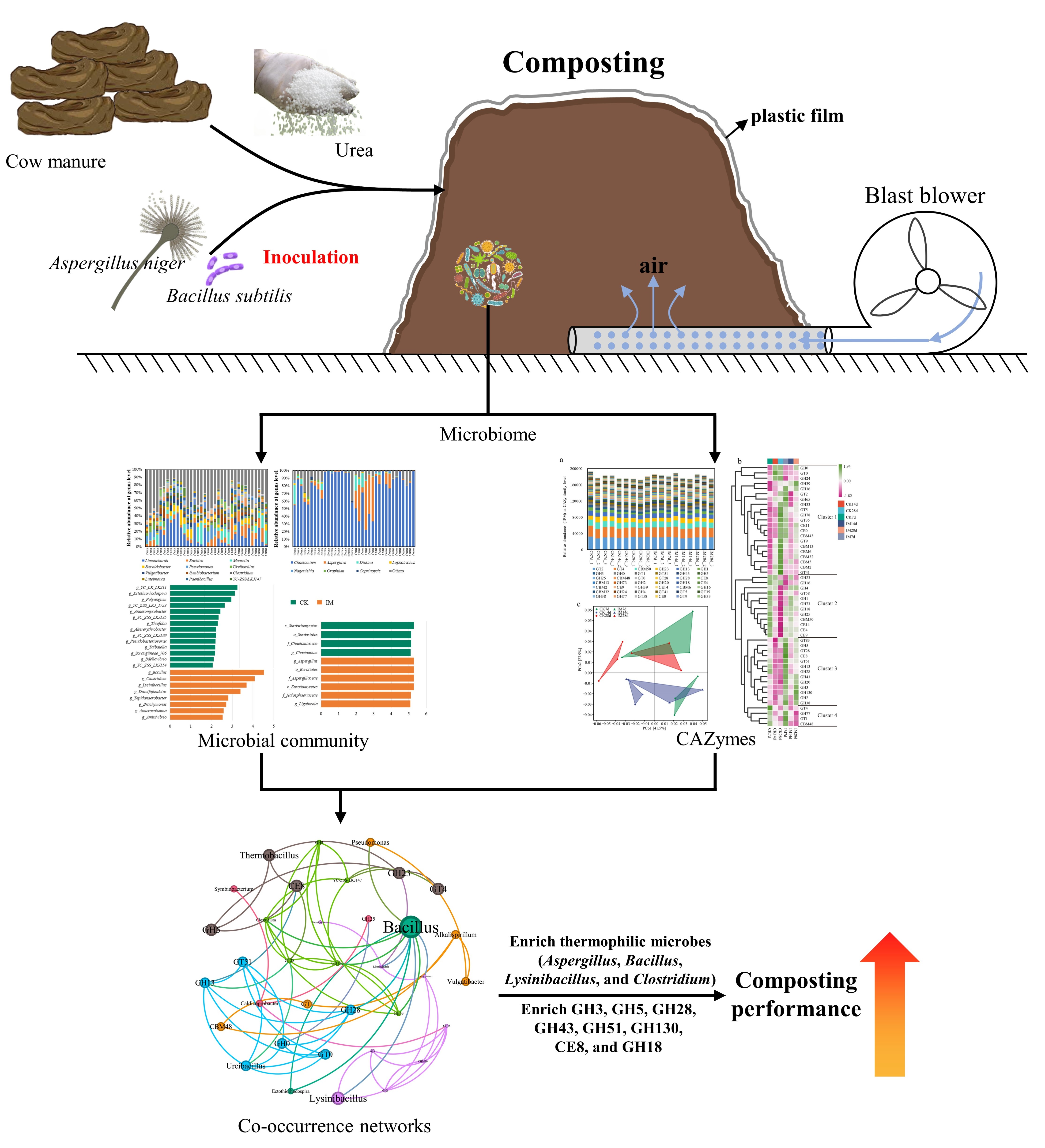南湖新闻网讯(通讯员 董卫卫)近日,我校生命科学技术学院、农业微生物资源发掘与利用全国重点实验室、益生菌智造创新团队在国际学术期刊Bioresource Technology上发表关于高效有机物料腐熟剂促进工业化牛粪堆肥性能的最新研究成果。论文以“Effect of simplified inoculum agent on performance and microbiome during cow manure-composting at industrial-scale”为题,报道了利用由特殊筛选的、仅有黑曲霉和枯草芽孢杆菌构成的高效有机物料腐熟剂,成功促进了工业化牛粪堆肥的性能,并从微生物组的视角详细阐述了相应的机理。
目前,全国畜禽粪污年产生量近40亿吨,其中畜禽直接排泄的粪便约18.8亿吨,给养殖业的可持续发展带来了巨大挑战。为解决粪便的污染问题,添加有机物料腐熟剂进行固体堆肥被认为是一种极具前景的处理方式,旨在最大程度地减少对环境的负面影响,将其转化为有机肥或者生物有机肥,从而实现可持续发展。

图1 简化接种剂促进工业化牛粪堆肥图片摘要
研究团队通过采用一种简单的有机物料腐熟剂(特殊筛选的黑曲霉和枯草芽孢杆菌)即可驱动和促进工业化的牛粪堆肥。该接种剂可加速堆肥温度的上升,使堆肥高温阶段的温度提高7–10 °C,延长整个堆肥过程中50 °C以上温度维持天数(由12天提升为26天),进而促进堆肥的成熟。通过扩增子测序和宏基因组测序,发现接种剂能促进曲霉属在堆肥升温阶段的富集,实现有机质的降解,为其他微生物提供基础代谢物,促进微生物群落多样性,并协同产生热量,使得堆体升温,启动整个堆肥过程。随着堆体温度不断上升,许多微生物因为不耐热而死亡。而简化接种剂中的耐热微生物(芽孢杆菌)接力在高温下存活发挥功能,与其他耐热微生物(如Clostridium和Lysinibacillus)合作,通过核心CAZymes (GH3、GH5、GH28、GH43、GH51、GH130、CE8和GH18)降解底物,并通过糖代谢途径持续产生热量,从而促进堆肥过程和堆肥成熟。
我校生命科学技术学院博士后董卫卫为论文第一作者,赵述淼副教授为通讯作者。该研究得到湖北省重点研发计划(2020BBA054)和国家重点研发计划(2023YFE0104900)的资助。
[英文摘要]
A simplified inoculum agent, only comprising Bacillus subtilis and Aspergillus niger, was utilized for industrial-scale cow-manure composting to investigate its impact on composting performance and microbiome. Inoculants elevated the average and peak temperatures by up to 7 and 10 °C, respectively, during the thermophilic stage, reduced organic matter content, and raised germination index. Inoculation also extended the period of composting above 50 °C from 12 to 26 days. Sequencing unveiled significant shifts in microbial diversity, composition, and function. Aspergillus thrived during the mesophilic phase, potentially initiating composting, whereas Bacillus, Lysinibacillus, and Clostridium were enriched during the thermophilic stage. Metagenomic sequencing revealed an increased abundance of carbohydrate-active enzymes and glycometabolism-related genes responsible for lignocellulose degradation and heat generation after inoculation. These enriched microbes and functional genes contributed to organic matter degradation and temperature maintenance during thermophilic stage, expediting composting. This suggests the effectiveness of this simplified inoculum in industrial-level cow-manure composting.
原文链接:https://doi.org/10.1016/j.biortech.2023.130097
审核:赵述淼